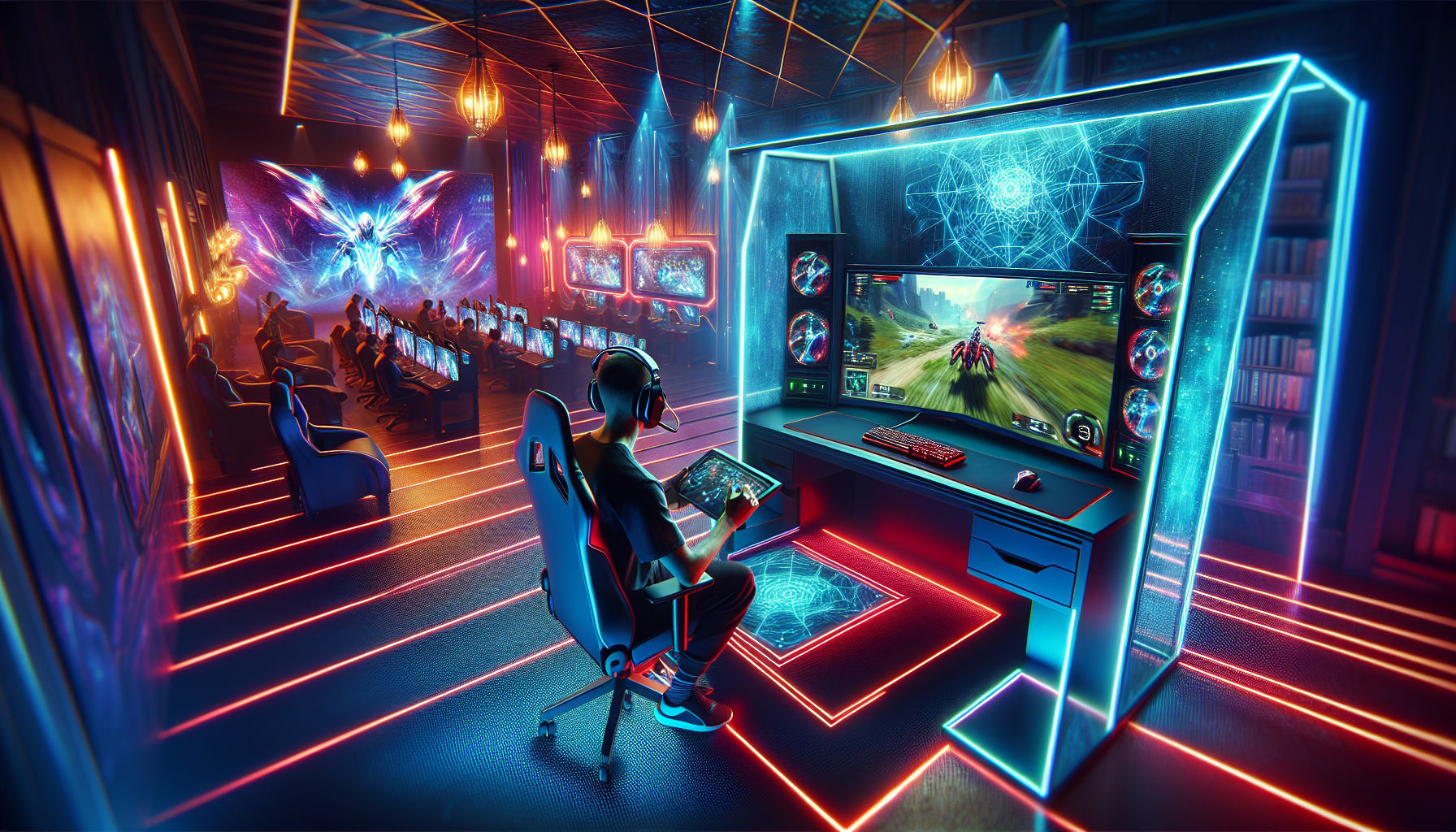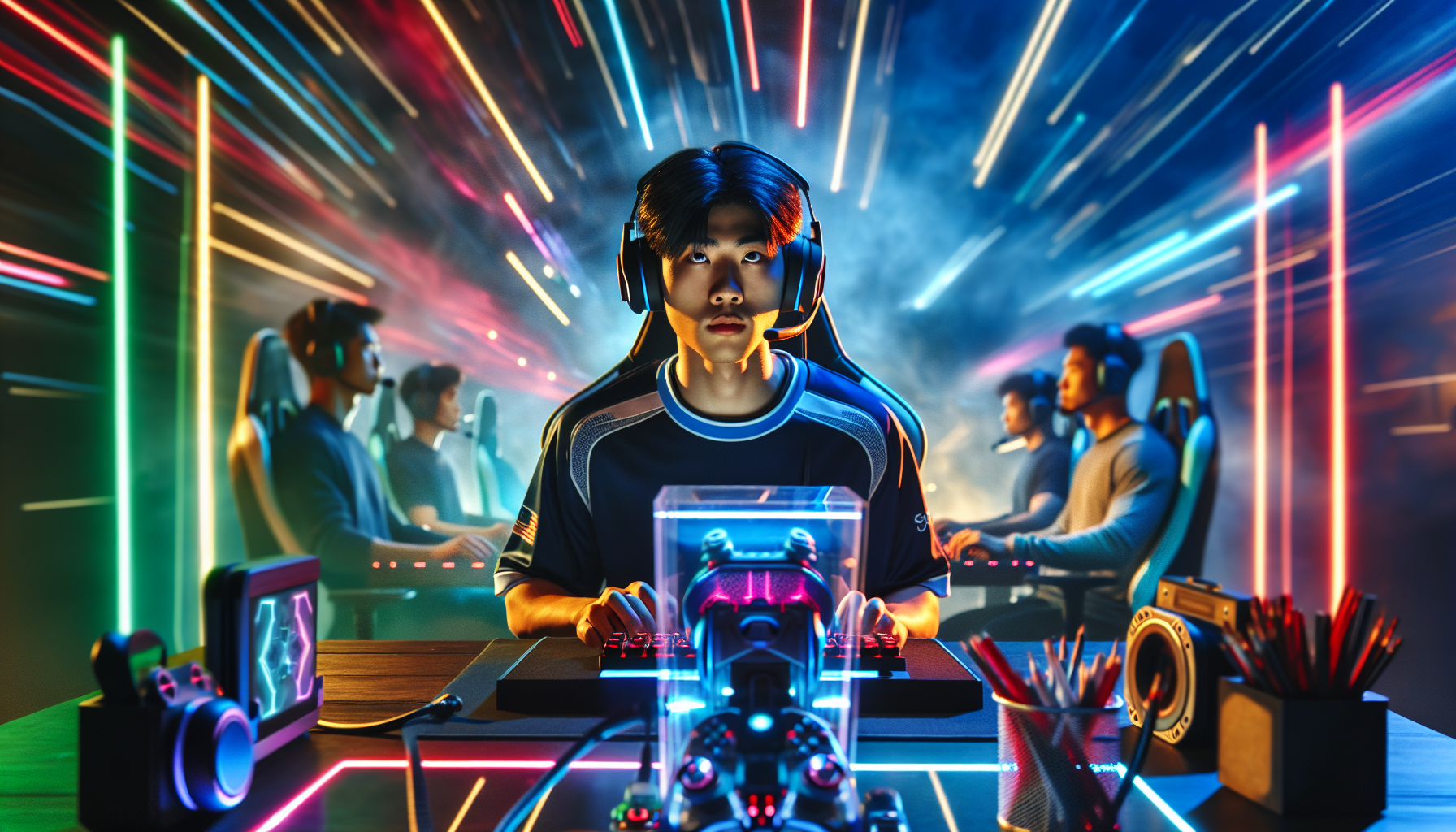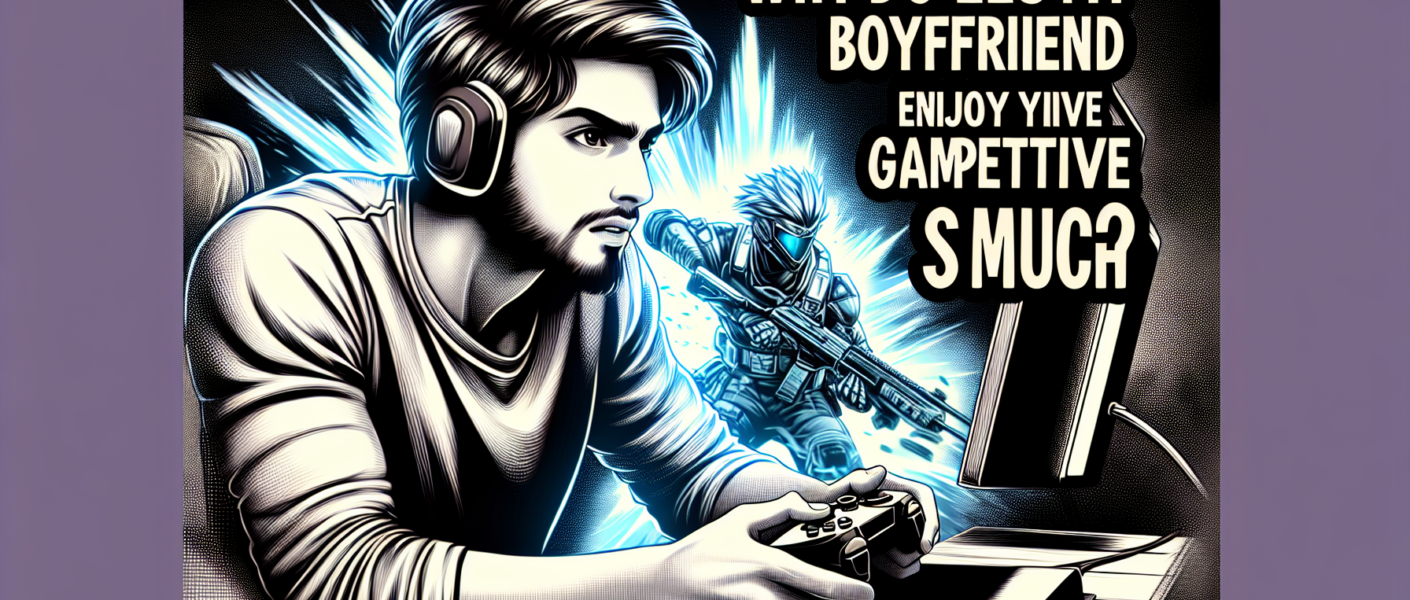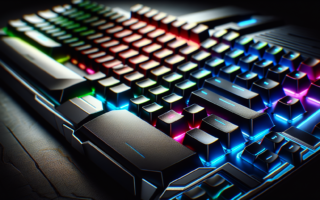Have you ever found yourself wondering why your boyfriend is so invested in competitive gaming? The intensity and passion he displays for these virtual battles may seem foreign to you, but fear not, for there is a fascinating psychology behind his love for this highly competitive form of entertainment. Understanding the reasons that drive his obsession with competitive gaming can bring you closer, granting you a deeper insight into his world and fostering a stronger connection between the two of you. So, let’s explore the captivating realm of competitive gaming and unravel the motivations that make it an irresistible allure for your boyfriend.
The Appeal of Competitive Gaming
Understanding the competitive nature
Competitive gaming, also known as esports, has gained immense popularity in recent years. It appeals to a large audience due to its competitive nature, offering participants a platform to showcase their skills and abilities. The thrill of facing off against opponents and the drive to come out on top create an adrenaline-fueled environment that many find captivating.
Thrill of victory
One of the main appeals of competitive gaming is the exhilaration that comes with achieving victory. The sense of accomplishment and pride that follows a hard-fought win can be deeply satisfying. Whether it’s a small-scale online tournament or a high-stakes event, the rush of winning provides a unique form of gratification that is difficult to replicate in other activities.
Sense of accomplishment
Competitive gaming offers a sense of accomplishment, especially when players constantly strive to improve their skills and achieve personal milestones. Progressing through ranks and leagues, unlocking achievements, and mastering challenging gameplay mechanics can provide a sense of purpose and satisfaction. This feeling of growth and improvement keeps players engaged and motivated to continue pushing their limits.
Opportunity for personal growth
Engaging in competitive gaming can also contribute to personal growth. To excel in this field, players need to develop various skills such as critical thinking, decision-making, and adaptability. Additionally, they often have to work on their communication and teamwork abilities as many competitive games require coordination with teammates. The challenges faced in the competitive gaming realm can help individuals become more resilient, enhance their problem-solving skills, and develop a strategic mindset.
Social interaction and community
Competitive gaming acts as a social hub where individuals with similar interests can connect and interact. Online multiplayer games provide a platform for players to engage in teamwork, coordinating strategies and communicating with each other. This collaborative element fosters a sense of camaraderie and creates opportunities for lasting friendships to form. Additionally, the competitive gaming community offers various forums, social media groups, and local events that allow enthusiasts to share experiences, exchange knowledge, and support each other.
The Psychological Motivators
Desire for mastery
Many individuals are driven by the desire to become experts in their chosen pursuits, and competitive gaming is no exception. The opportunity to master a particular game, understand its mechanics, and continually improve performance acts as a powerful motivator. The pursuit of mastery provides a sense of purpose and fulfillment as players strive to reach the pinnacle of their abilities.
Competitive drive
Competitive gaming attracts individuals who possess a strong competitive drive. The urge to measure oneself against others, prove one’s skills, and emerge victorious fuels their passion for gaming. For such individuals, the thrill of competition and the adrenaline rush that accompanies it are major driving factors. The satisfaction derived from outperforming opponents and achieving success motivates them to dedicate significant time and effort to competitive gaming.
Self-esteem and validation
Success in competitive gaming can contribute to an individual’s self-esteem and validation. Achieving recognition through victories, earning respect from peers, and receiving praise for exceptional gameplay all play a role in boosting self-confidence. Moreover, competitive gaming allows individuals to set goals, overcome challenges, and witness tangible results, which can lead to an increased sense of self-worth.
Adrenaline rush
The high-intensity nature of competitive gaming often triggers an adrenaline rush, creating an exciting and immersive experience. The surge of adrenaline can increase focus, reaction time, and overall performance, making the gameplay more engaging and stimulating. This heightened state of arousal adds an extra layer of excitement and thrill to the gaming experience, making it an appealing activity for many enthusiasts.
Escape from reality
For some individuals, competitive gaming offers an escape from the monotony or stress of daily life. Immersing oneself in a virtual world, where skill and strategy prevail, allows players to temporarily forget their real-world concerns and challenges. This escapism provides a mental break and a chance to recharge, making competitive gaming a source of relaxation and entertainment.
The Benefits of Competitive Gaming
Improves cognitive abilities
Engaging in competitive gaming can have significant cognitive benefits. The need to process information rapidly, make split-second decisions, and anticipate opponents’ moves enhances cognitive abilities such as attention, memory, and problem-solving skills. Constantly analyzing game situations and formulating strategies improves mental agility and adaptability, which can extend beyond gaming into other areas of life.
Enhances problem-solving skills
Competitive gaming often presents players with complex challenges that require quick thinking and strategic decision-making. Constantly encountering hurdles and finding innovative ways to overcome them enhances problem-solving skills. The ability to assess situations, evaluate options, and make effective choices based on limited information can translate into improved problem-solving abilities in real-world scenarios.
Boosts concentration and focus
Competitive gaming demands intense concentration and focus. To perform well, players must maintain their attention on multiple aspects simultaneously, including map awareness, enemy movements, and team coordination. This level of focused attention trains the brain to filter out distractions and improve concentration skills. These enhanced abilities can be valuable in academic or professional settings where sustained focus is crucial.
Develops strategic thinking
Competitive gaming requires strategic thinking and planning, as players must constantly adapt their tactics based on the evolving situation. Engaging in this level of strategic thinking improves the ability to analyze complex scenarios, weigh different options, and make informed decisions. These skills can be applied to various real-life situations, such as problem-solving at work or making decisions in personal relationships.
Fosters teamwork and communication
Many competitive games rely heavily on teamwork and effective communication between players. Collaborating with teammates, coordinating strategies, and communicating in fast-paced environments strengthen these important social skills. Learning to work as part of a team, understanding others’ perspectives, and communicating clearly are invaluable qualities that extend beyond the gaming realm and into personal and professional relationships.
The Competitive Gaming Community
Sense of belonging
The competitive gaming community offers a strong sense of belonging for individuals who share a passion for gaming. Being part of a community that understands and appreciates their interests can provide a support network and a sense of identity. This sense of belonging contributes to a feeling of acceptance and can help combat loneliness or isolation that individuals may experience.
Opportunity for networking
Competitive gaming provides opportunities for networking and connecting with like-minded individuals. Online platforms, social media groups, and local events enable players to meet and interact with others who share their passion. These connections can lead to friendships, mentorship opportunities, and even potential career paths within the gaming industry.
Learning from others
Being part of the competitive gaming community offers the chance to learn from seasoned players and gain valuable insights. Engaging with experienced gamers provides access to strategies, gameplay techniques, and tips for improvement. This knowledge-sharing environment fosters personal growth and development, as players can continuously expand their skill set by drawing from the expertise of others.
Shared passion and interests
Competitive gaming provides a platform for individuals to connect over shared passions and interests. Gaming communities often extend beyond the games themselves, with enthusiasts discussing various topics such as gaming culture, industry news, and trends. This shared bond creates a sense of camaraderie and facilitates meaningful interactions among community members.
Participation in tournaments and events
The competitive gaming community offers opportunities to participate in tournaments and events, ranging from local competitions to international championships. These events not only provide a platform to showcase skills but also offer a chance to experience the excitement of live competitions and engage with a broader gaming community. Participating in such events can be an adrenaline-fueled adventure, leaving players with cherished memories and the motivation to improve further.

The Challenges of Competitive Gaming
Dealing with pressure and stress
Competitive gaming comes with its fair share of pressure and stress. The desire to perform well and meet personal and team expectations can create a high-stress environment. managing nerves, dealing with the pressure of competition, and performing under intense scrutiny are constant challenges for competitive gamers. Developing effective coping mechanisms, maintaining a positive mindset, and seeking support are crucial in navigating these challenges.
Managing time and balance
Competitive gaming requires a significant time investment, and finding a balance between gaming and other responsibilities can be challenging. It is vital to manage time effectively, prioritize tasks, and maintain a healthy balance between gaming, work, education, relationships, and self-care. Striking a balance ensures that competitive gaming remains a positive and enjoyable experience without neglecting other important aspects of life.
Coping with losing
Losing is an inherent part of competitive gaming, and dealing with defeat can be emotionally challenging. The ability to accept losses, learn from mistakes, and bounce back with resilience is crucial for personal growth. Developing a healthy mindset that views losses as learning opportunities rather than failures is essential for long-term enjoyment and success in competitive gaming.
Maintaining a healthy mindset
Competitive gaming can sometimes lead to frustration, burnout, or feelings of self-doubt. Maintaining a healthy mindset involves recognizing the importance of self-care, setting realistic expectations, and prioritizing mental well-being. Taking regular breaks, practicing stress-management techniques, and seeking support when needed are essential for preserving a positive mindset and long-term enjoyment of competitive gaming.
Avoiding addiction and excessive gaming
As with any form of entertainment, competitive gaming carries the risk of addiction and excessive gaming behavior. It is important to maintain a healthy balance and set boundaries to prevent gaming from interfering with other areas of life. Being aware of warning signs of addiction, such as neglecting responsibilities, social withdrawal, and experiencing distress when not gaming, is crucial. Seeking professional help, if necessary, can aid in developing a healthy relationship with gaming.
The Evolution of Competitive Gaming
The rise of esports
Esports, the competitive form of gaming, has experienced exponential growth in recent years. Esports tournaments now fill arenas, attract millions of viewers online, and offer substantial prize pools. The increased viewership and investment in esports have transformed competitive gaming into a global phenomenon that rivals traditional sports in terms of popularity and recognition.
Professional gaming careers
Competitive gaming has evolved into a lucrative career path for many talented individuals. Professional gamers now have the opportunity to turn their passion into a full-time profession. Competing in tournaments, securing sponsorships, and streaming gameplay on platforms like Twitch have opened up possibilities for gamers to earn substantial income and become recognized figures within the industry.
Influence on mainstream entertainment
Competitive gaming has seeped into mainstream entertainment, with major broadcasters and streaming platforms dedicating coverage to esports events. The rise of esports leagues and the inclusion of gaming content in popular media outlets have widened the reach of competitive gaming, attracting a more diverse audience. Gaming is now considered a legitimate form of entertainment, transcending cultural barriers and reshaping the landscape of modern entertainment.
Technological advancements
The advancements in technology have significantly contributed to the growth and evolution of competitive gaming. High-performance gaming equipment, faster internet speeds, and immersive virtual reality experiences have elevated the gaming experience to new heights. These technological advancements have enhanced gameplay, enabled more realistic graphics, and expanded the possibilities for competitive gaming.
Global recognition and popularity
Competitive gaming has gained global recognition and popularity, transcending geographical boundaries. Major tournaments attract participants and viewers from all corners of the world, creating a global community of gaming enthusiasts. The inclusivity and connectivity offered by competitive gaming have helped foster a shared passion that unites individuals from diverse backgrounds, cultures, and languages.

Understanding Gaming as a Hobby
Different types of gamers
The realm of competitive gaming encompasses a wide range of individuals with diverse gaming preferences and playing styles. Some players prefer fast-paced action games, while others may enjoy strategy-based games or immersive role-playing experiences. Understanding these different types of gamers helps create an inclusive and diverse gaming community that embraces all interests and preferences.
Appeal of virtual worlds
Competitive gaming offers the opportunity to explore virtual worlds and engage in immersive experiences. These virtual realms often provide an escape from reality, allowing players to step into fantastical worlds and assume different roles. The appeal of exploring these virtual worlds, conquering challenges, and embarking on epic quests is a major draw for many gaming enthusiasts.
Relationship to other hobbies and interests
Gaming as a hobby often goes hand in hand with other interests and hobbies. Many gamers find joy in exploring the connections between gaming and other forms of entertainment, such as movies, music, and art. Additionally, gaming can serve as a platform for creative expression, with individuals engaging in activities such as game design, content creation, and storytelling within gaming communities.
Psychological benefits of hobbies
Engaging in hobbies, such as competitive gaming, offers several psychological benefits. Hobbies provide a much-needed break from daily routines, reduce stress, and promote overall well-being. They serve as outlets for self-expression, creativity, and relaxation. For many gamers, competitive gaming acts as a rewarding hobby that allows them to tap into their passion and enjoy a sense of accomplishment.
Balancing gaming with other activities
Maintaining a healthy balance between gaming and other activities is essential for overall well-being. While competitive gaming can be immersive and captivating, it is crucial to allocate time to other responsibilities, relationships, physical activity, and self-care. Striking a balance ensures that gaming remains a positive and enjoyable aspect of life, rather than becoming overwhelming or detrimental.
Factors Influencing Gaming Preferences
Personal preferences and tastes
Individuals’ gaming preferences are influenced by personal tastes and interests. Factors such as preferred genres, art styles, gameplay mechanics, and storytelling impact the type of games individuals gravitate towards. Some may enjoy fast-paced, competitive games, while others may prefer slow-paced, story-driven experiences. These personal preferences contribute to the diverse range of games available and the varied interests within the gaming community.
Introduction or influence from others
The introduction or influence from friends, family, or peers can play a significant role in shaping gaming preferences. Recommendations, shared experiences, and multiplayer gaming sessions with others can introduce individuals to new games or genres they may not have considered before. The social aspect of gaming often exposes players to different games and cultivates a sense of camaraderie and shared experiences.
Availability and accessibility of games
The availability and accessibility of games also influence gaming preferences. The gaming industry offers a vast library of titles across multiple platforms, catering to various preferences. Factors such as cost, platform compatibility, and ease of access affect individuals’ choices. For example, some players may gravitate towards mobile games for their convenience and accessibility, while others may prefer console or PC gaming for the immersive experience they offer.
Gaming platforms and devices
The choice of gaming platform and device can affect gaming preferences. Different platforms, such as consoles, PCs, and mobile devices, offer unique gaming experiences, exclusive titles, and diverse gameplay options. Factors such as graphics capabilities, performance, and controller preferences can influence individuals’ platform choices and subsequently shape their gaming preferences.
Game content and genres
Game content and genres are crucial factors in determining gaming preferences. Some individuals may be drawn to action-packed shooters, while others may prefer narrative-driven role-playing games or competitive multiplayer experiences. The storytelling, gameplay mechanics, and themes within a game can strongly resonate with individuals and influence their gaming preferences.

Communication and Support
Open conversations about gaming
Open conversations about gaming are crucial in understanding and supporting the interests of those involved in competitive gaming. Encouraging dialogue allows for a deeper understanding of the passion and enjoyment individuals derive from gaming. It also provides an opportunity for non-gamers to gain insights into the positive aspects of competitive gaming and dispel any misconceptions or stigmas associated with the activity.
Understanding the importance
Recognizing the importance of competitive gaming as a hobby or career choice is essential in providing support and understanding. Rather than dismissing gaming as a frivolous activity, acknowledging its positive impacts on mental well-being, personal development, and social interaction helps foster empathy and a supportive environment for gamers. By understanding the significance of competitive gaming, loved ones can better support and engage with those who participate in it.
Supporting each other’s interests
Creating a supportive environment means embracing and supporting each other’s interests, even if they may differ from one’s own. Encouraging loved ones who engage in competitive gaming by attending their tournaments, sharing their achievements, and showing genuine interest in their gaming experiences can strengthen relationships. Celebrating milestones and offering encouragement can foster a sense of mutual support within relationships.
Setting boundaries and expectations
Setting boundaries and expectations is important to maintain healthy relationships and ensure that gaming does not negatively impact other areas of life. Openly discussing the time commitments, scheduling agreements, and priorities helps establish a balance between gaming and other responsibilities. This clear communication fosters mutual understanding and ensures that gaming remains a positive part of life without causing conflicts or misunderstandings.
Navigating conflicts and compromises
Conflicts may arise when gaming preferences clash with the interests of others. Navigating these conflicts requires open communication, respect, and willingness to compromise. Finding common ground, exploring shared interests, and seeking activities that cater to both gamers and non-gamers can help bridge any gaps and strengthen relationships. Recognizing the value of each other’s hobbies fosters a harmonious environment.
The Future of Competitive Gaming
Continued growth and innovation
Competitive gaming shows no sign of slowing down, with continued growth and innovation being expected. The industry will likely see the emergence of new genres, innovative gameplay mechanics, and advancements in technology. The ever-increasing popularity of competitive gaming ensures continuous evolution, with exciting possibilities for both enthusiasts and aspiring professionals.
Integration of virtual reality
The integration of virtual reality (VR) is predicted to have a significant impact on the future of competitive gaming. VR technology offers a level of immersion and interactivity that brings players closer to the gaming experience. With the ability to physically engage with virtual environments, players can expect a heightened sense of presence and a more immersive competitive gaming experience.
Mental health considerations
As competitive gaming continues to grow, the industry and its participants have begun placing a greater emphasis on mental health. Recognizing and addressing the unique stressors and challenges that come with competitive gaming is becoming a priority. Initiatives promoting self-care, stress management, and healthy gaming habits are being developed to ensure the well-being of both players and the community as a whole.
Redefining stereotypes and stigmas
The future of competitive gaming holds the potential to challenge and redefine existing stereotypes and stigmas associated with the activity. As esports gain further recognition and acceptance, traditional notions that gaming is solely a solitary and antisocial activity are being challenged. By highlighting the positive impacts of competitive gaming and fostering understanding, the community can break down barriers and reshape public perception.
Capitalizing on educational potential
Competitive gaming has the potential to offer educational benefits that can be harnessed in educational settings. As the industry continues to grow, schools and educational institutions are exploring the integration of competitive gaming into curricula. Incorporating gaming in educational contexts can facilitate skill development, critical thinking, teamwork, and problem-solving abilities in students. By capitalizing on the educational potential of competitive gaming, it can become a recognized and valued part of the learning experience.






[…] know they should prioritize sleep. The desire to excel, rank high on leaderboards, or be part of a competitive gaming community can create a sense of urgency to stay engaged in the game, leading to late nights and compromised […]